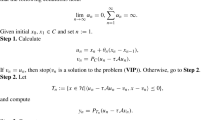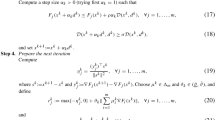Abstract
Assuming that the primal part of the sequence generated by a Newton-type (e.g., SQP) method applied to an equality-constrained problem converges to a solution where the constraints are degenerate, we investigate whether the dual part of the sequence is attracted by those Lagrange multipliers which satisfy second-order sufficient condition (SOSC) for optimality, or by those multipliers which violate it. This question is relevant at least for two reasons: one is speed of convergence of standard methods; the other is applicability of some recently proposed approaches for handling degenerate constraints. We show that for the class of damped Newton methods, convergence of the dual sequence to multipliers satisfying SOSC is unlikely to occur. We support our findings by numerical experiments. We also suggest a simple auxiliary procedure for computing multiplier estimates, which does not have this undesirable property. Finally, some consequences for the case of mixed equality and inequality constraints are discussed.
Similar content being viewed by others
References
Anitescu, M.: Nonlinear programs with unbounded Lagrange multiplier sets. Preprint ANL/MCS-P796-0200, Mathematics and Computer Science Division, Argonne National Laboratory, Argonne (2000)
Anitescu M. (2005). On using the elastic mode in nonlinear programming approaches to mathematical programs with complementarity constraints. SIAM J. Optim. 15: 1203–1236
Anitescu, M., Tseng, P., Wright, S.J.: Elastic-mode algorithms for mathematical programs with equilibrium constraints: global convergence and stationarity properties. Math. Program. (in press)
Arutyunov A.V. (2000). Optimality Conditions: Abnormal and Degenerate Problems. Kluwer, Dordrecht
Arutyunov A.V. (1992). Optimality conditions of higher order for abnormal minimization problems. Siberian Math. J. 33: 557–565
Bonnans J.F. and Shapiro A. (2000). Perturbation Analysis of Optimization Problems. Springer, New York
Fischer A. (1999). Modified Wilson’s method for nonlinear programs with nonunique multipliers. Math. Oper. Res. 24: 699–727
Fischer A. (2002). Local behaviour of an iterative framework for generalized equations with nonisolated solutions. Math. Program. 94: 91–124
Fletcher R., Leyffer S., Ralph D. and Scholtes S. (2006). Local convergence of SQP methods for mathematical programs with equilibrium constraints. SIAM J. Optim. 17: 259–286
Golubitsky M. and Schaeffer D.G. (1985). Singularities and Groups in Bifurcation Theory, vol 1. Springer, Heidelberg
Hager W.W. (1999). Stabilized sequential quadratic programming. Comput. Optim. Appl. 12: 253–273
Hager W.W. and Gowda M.S. (1999). Stability in the presence of degeneracy and error estimation. Math. Program. 85: 181–192
Izmailov A.F. (2005). On the analytical and numerical stability of critical Lagrange multipliers. Comput. Math. Math. Phys. 45: 930–946
Izmailov A.F. (2000). 2-Regularity and reversibility of quadratic mappings. Contemporary Math. 272: 127–134
Izmailov A.F. and Solodov M.V. (2001). Optimality conditions for irregular inequality-constrained problems. SIAM J. Control Optim. 40: 1280–1295
Izmailov A.F. and Solodov M.V. (2002). The theory of 2-regularity for mappings with Lipschitzian derivatives and its applications to optimality conditions. Math. Oper. Res. 27: 614–635
Izmailov A.F. and Solodov M.V. (2002). Complementarity constraint qualification via the theory of 2-regularity. SIAM J. Optim. 13: 368–385
Izmailov A.F. and Solodov M.V. (2004). Newton-type methods for optimization problems without constraint qualifications. SIAM J. Optim. 15: 210–228
Izmailov, A.~F., Tretyakov, A.~A.: 2-Regular Solutions of Nonlinear Problems. Theory and Numerical Methods (in Russian). Fizmatlit, Moscow (1999)
Leyffer, S.: MacMPEC: AMPL collection of MPECs. www.mcs.anl.gov/leyffer/MacMPEC/
Li, D.-H., Qi, L.: A stabilized SQP method via linear equations. Applied mathematics technical report AMR00/5, The University of New South Wales (2000)
Luo Z.-Q., Pang J.-S. and Ralph D. (1996). Mathematical Programs with Equilibrium Constraints. Cambridge University Press, Cambridge
Maratos, N.: Exact penalty function algorithms for finite dimensional and control optimization problems. PhD thesis, Imperial College, London (1978)
Robinson, S.M.: False numerical convergence in some generalized Newton methods. In: Equilibrium problems and variational models (Erice, 2000), Nonconvex Optim. Appl., vol. 68, pp 401–416. Kluwer, Norwell (2003)
Robinson S.M. (1980). Strongly regular generalized equations. Math. Oper. Res. 5: 43–62
Scheel H. and Scholtes S. (2000). Mathematical programs with complementarity constraints: stationarity, optimality and sensitivity. Math. Oper. Res. 25: 1–22
Scholtes S. and Stöhr M. (1999). Exact penalization of mathematical programs with equilibrium constraints. SIAM J. Control Optim. 37: 617–652
Scholtes S. and Stöhr M. (2001). How stringent is the linear independence assumption for mathematical programs with complementarity constraints?. Math. Oper. Res. 26: 851–863
Wright S.J. (1998). Superlinear convergence of a stabilized SQP method to a degenerate solution. Comput. Optim. Appl. 11: 253–275
Wright S.J. (2002). Modifying SQP for degenerate problems. SIAM J. Optim. 13: 470–497
Wright S.J. (2003). Constraint identification and algorithm stabilization for degenerate nonlinear programs. Math. Program. 95: 137–160
Wright S.J. (2005). An algorithm for degenerate nonlinear programming with rapid local convergence. SIAM J. Optim. 15: 673–696
Author information
Authors and Affiliations
Corresponding author
Additional information
Dedicated to Professor Stephen Robinson on the occasion of his 65th birthday. The second author remembers, with a sense of privilege, the courses and advice he received from Professor Robinson during his stay at UW-Madison.
The first author is supported by the Russian Foundation for Basic Research Grant 04-01-00341, by RF President’s Grant NS-9344.2006.1 for the support of leading scientific schools, and by RF President’s Grant MD-2723.2005.1 for the support of young doctors of sciences. The second author is supported by CNPq Grants 301508/2005-4, 490200/2005-2, 550317/2005-8, by PRONEX, and by FAPERJ.
Rights and permissions
About this article
Cite this article
Izmailov, A.F., Solodov, M.V. On attraction of Newton-type iterates to multipliers violating second-order sufficiency conditions. Math. Program. 117, 271–304 (2009). https://doi.org/10.1007/s10107-007-0158-9
Received:
Accepted:
Published:
Issue Date:
DOI: https://doi.org/10.1007/s10107-007-0158-9




